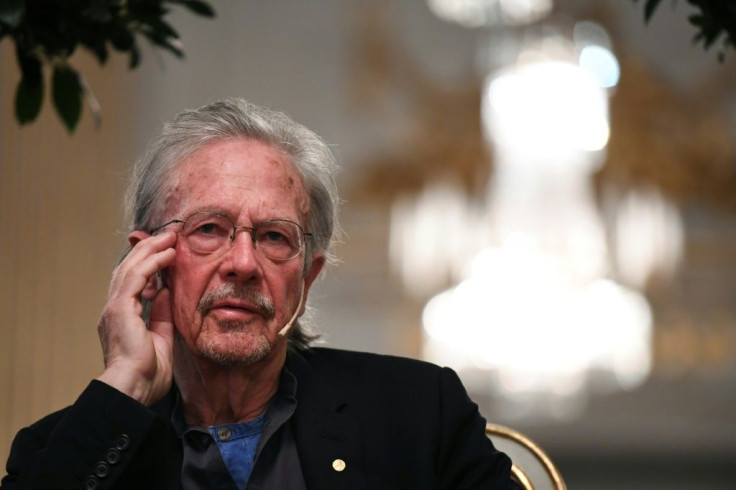Nobel Winner Handke Dodges Questions On Balkan Wars

Nobel literature laureate Peter Handke is days away from receiving his award, but the controversial author known for his pro-Serb stance in the wars in former Yugoslavia said Friday he preferred literature to opinions.
The Swedish Academy's pick for the 2019 prize, announced in October, triggered outrage in the Balkans and beyond because of Handke's support for the late Serbian strongman Slobodan Milosevic.
"I like literature, not opinions," Handke said at a news conference on Friday ahead of the December 10 ceremony in Stockholm.
"I hate opinions," the Austrian author said in response to a journalist's question on whether he had changed his mind about what happened in the Balkans in the 1990s.
In 1997 Handke was accused of minimising Serb war crimes in his book "A Journey to the Rivers: Justice for Serbia".
He also drew criticism for speaking at the 2006 funeral of Milosevic, who died while on trial for genocide, war crimes and crimes against humanity.
Up to 1,000 people are expected to protest in central Stockholm on Tuesday against the award due to be handed to him by Sweden's King Carl XVI Gustaf.
Handke said Friday he had tried to establish a dialogue with his critics and said he wanted to make a gesture of "reconciliation".
"I asked a friend in Bosnia and Herzegovina how to realise this idea but he told me for the moment it's not possible," he said.
"I wanted to meet two different mothers, not organised mothers but two lonely mothers who lost their children," he said, explaining that he would like to meet one from the Serbian side and one from the Muslim side.
"I'm open to this," he added.
The news conference began with a choir in the audience singing "Happy Birthday" to the Nobel Prize winner, 77.
But asked why his books did not mention the work of the International Criminal Tribunal for the former Yugoslavia, which recognised Srebrenica as genocide, Handke referenced a recent letter sent to him.
"I prefer an anonymous letter with toilet paper to your empty and ignorant questions," he said, adding, he had also received many letters of support.
The Swedish Academy has been faced with a storm of criticism since 2017.
Just before the news conference on Friday, one committee member said he would boycott the award ceremony in protest.
"I will not participate in Nobel Week this year.... Celebrating Peter Handke's Nobel Prize would be pure hypocrisy on my part," Peter Englund, a historian and writer, told the daily Dagens Nyheter.
Englund headed the Swedish Academy between 2009 and 2015 and reported on the 1990s conflicts in the Balkans for Swedish newspapers.
Two other committee members announced their resignation on Monday.
Kristoffer Leandoer said he did not have "the patience" for the internal reforms the academy undertook after a sex scandal that rocked it in 2017.
Gun-Britt Sundstrom, meanwhile, said one of the reasons for her departure was because she was opposed to Handke being awarded this year's Nobel.
"The choice of 2019 laureate was not just a choice about a body of work, it has also been interpreted... as a defence of the stance that literature is above 'politics'," Sundstrom wrote in a comment to daily Dagens Nyheter this week.
© Copyright AFP 2024. All rights reserved.





















